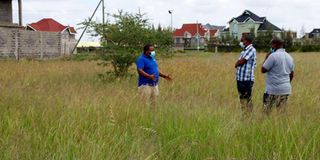Premium
Why you should insist on individual land title deed

Fanaka Real Estate Company Business Development Manager Wandera Dennis (left) with investors at their ongoing project in Green Valley Estate in Ruiru, Kiambu County on May 28, 2021.
Fraud cases involving land buying companies have become commonplace in recent years in Kenya, causing investors extreme pain.
A closer look shows that a good number of land selling outfits have with them mother title deeds, and a land subdivision plan, which may not be implemented in the end.
Buying land that only comes with a mother title deed is a risky affair, says Mr Abraham Samoei, president at Institution of Surveyors of Kenya (ISK) and the managing director at Ascenders Lenya Limited.
Mr Samoei says a mother title carries with it the lack of specificity.
“A land search becomes a risky affair with a mother title as it requires precision to size, actual location of the parcel and the actual plot number,” he said in an interview with Smart Business.
A mother title deed also has a lot of uncertainty as vendors do not have the capacity to subdivide land and neither can they process individual title deeds.
“We have seen many cases whereby land buyers have to go to courts to get specific performance orders to compel vendors to issue individual title deeds which is both time consuming and financially draining,” Mr Samoei says.
Due diligence
Due diligence also requires that any intending buyer checks whether the land has an adverse claim against the title deed.
“For instance, if there is a court case, the court delivers a judgement against the seller and then the same seller refuses to pay, the judgement creditor may upon receiving execution orders instruct auctioneers to attach the mother title deed,” says Mr Lawrence Gachanja, an advocate at Fanaka Real Estate Limited.
However, he adds, if a buyer has an individual title deed, they can stop auctioneers from selling their parcel.
Also, in case a land buyer wants to use the title deed as a security for a loan or mortgage, they cannot use the mother title. However, a ready individual title deed may be used as a collateral.

Institution of Surveyors of Kenya President Abraham Samoei during an interview at his Ambank building offices in Nairobi on May 31, 2021.
Due diligence also dictates that an intending buyer finds out if the proprietor has the capacity to deal with the land, which they want to sell. They should check if there are any other interests on the parcel such as a charge, caution, inhibition, restriction or any other encumbrance, advises Mr Gachanja.
One should visit the lands registry to conduct a search. “In the registry index map ascertain if what is captured on record is fully representative of what is on the ground,” advises Mr Samoei. To demarcate land boundaries, both the scientific and social boundaries should agree. The survey map should carry the social identification.
Due to corruption that has dogged the country, the land registry is not foolproof of corruption and fraud. In some cases, replacement of files has become fairly easy, says Mr Samoei.
Land valuer
However, the land valuer insists that there can only be one survey map that is authentic and carries all the details of the rightful landowner.
“Similarly, there can only be one original land title deed that details the rightful owner of land,” says the ISK president.
Digitisation of land records is expected to eliminate fraud cases involving documentation.
“When the survey map is digital, no one can super-impose it otherwise it will give an error,” he adds. The survey map is the best for land titling and as such a second title deed cannot be issued especially when it has been digitised.
The Institution of Surveyors of Kenya has over 4,000 registered land surveying professionals. Among them are land monitors, land valuers, land surveyors, and building surveyors.
There has been a growing interest in the property market in Kenya in the last 10 years, which has seen the association membership register a increment of about 400 members each year. The land property market in Kenya has grown in its investment and this has seen a need for skilled technical people in the matters, Mr Samoei.
Landowners
The government has a National Land Titling programme which has seen 5.1 million title deeds being issued to landowners since 2013. This is a great improvement compared to the six million title deeds which the government had issued to landowners across the country since 1963.
Also, Kenya has a land adjudication system that identifies land claimants before a title deed is issued. The land adjudication office identifies who are the genuine owners of land and the parcel size before a land survey is conducted.
However, many Kenyans shy from the land adjudication process because it is time-consuming as it entails tracing interests and allocations from how ancestral land has been handed down from grandparents to parents and to the children living there. This is where the problem of mother title deeds emanates from, says Mr Wandera.
With individual title deeds, the market is willing to pay a premium
Buying land that has a mother title should top the list of ‘the 1000 ways to die in Kenya’. A mother title deed does not carry the security of tenure because it could have other claimants.
While title deeds are in the process, a survey is still a subdivision plan until it has been amended on official government registry maps, says Mr Samoei, president, Institution of Surveyors of Kenya (ISK).
A land search on a mother title lacks precision and spells uncertainty such that the purchaser has to wait for the individual title deed to be processed so that they can do another search which consumes both time and resources.
In this case, projects with individual title deeds are safer, says Mr. Dennis Wandera, business development manager at Fanaka Real Estate Limited.
“The risk comes in because many land vendors subdivide and sell land before they even finalise with the individual owner of the parcel,” comments Mr Wandera. This locks all the buyers in one big nightmare – a mother title deed – spelling uncertainty and creating loopholes for fraud.
Land seller
With Fanaka Real Estate, they first settle any payment claims with the land seller and the mother title is transferred into their name. “We then commence the procedure of subdivision and processing individual title deeds in our name. Once our client finishes paying the purchase price, we transfer the individual title deed into their name,” says Mr Wandera.
Since the transfer is inclusive of the purchase price, the buyer gets to enjoy the advantage of time as within 30 days after finalising with payments, they have their title deed delivered in their name.
An individual title deed is an asset and security that enables one to grow their wealth in a secure manner as it verifies the land owner. “This is as opposed to a mother title deed whereby a land buyer has to wait for all the other buyers to finalise with their payments before starting mutation,” says Mr Wandera.
This incurs a cost of the mutation process, forcing the client to pay extra charges. An individual title deeds edges the client against any litigation issue.
The security of an individual title deed comes in that it has a legal backing and the land buyer can use it as collateral in bank financing or asset financing. “The market is willing to pay a premium, if the documentation is ready the price no longer becomes an issue,” Mr Wandera comments.
Big player
Selling land that has individual land titles has been a successful business strategy for Fanaka Real Estate since their debut in the market five years ago. This has seen the firm register exponential growth, transiting from a start-up to a mid-sized company and a big player in the real estate sector in Kenya. Projects with individual titles sell out within three to four months, he adds.
This year, Fanaka has some 12 projects which are running, with three in Ruiru all of which are sold, and four that have been completely sold out along satellite towns of Kangundo Road, Kamulu, Joska and Malaa. Every month, the firm launches a new project.
The market has responded with a high appetite for residential plots with ready title deeds. This has seen Fanaka establish a new branch office in Ruiru, with another branch earmarked for Mombasa Road to serve the Nairobi Metropolitan.
By the end of 2022, Fanaka wants to establish six more branches. As part of their value addition, the firm does not charge the transfer fees to the buyers and ensures that all their plots are securely fenced, connected to water, electricity, and that the roads are graded and murramed.





